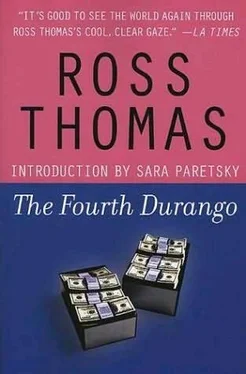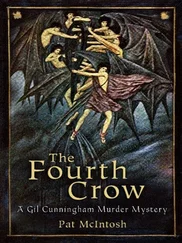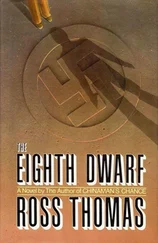On the well-polished oak floor was a large and gaudy woven wool rug that Vines suspected of being from the Yucatán. There was no television set but plenty of books and on the walls were three Monet prints and two posters.
One of the posters displayed a tasty-looking bunch of wet purple grapes with a slogan that read: “The Wrath of Grapes. Join the Boycott Again!” The other poster showed a highly stylized worker banging away at something with a couple of hammers. Below him was Bertolt Brecht’s forlorn hope: “Art is not a mirror held up to reality, but a hammer with which to shape it.”
Vines followed Adair and Huckins around the dining area’s glass and chrome table, into the kitchen, out the back door and onto a used-brick patio where Chief of Police Sid Fork, wearing an apron made out of what looked like mattress ticking, presided over the charcoal grill.
They talked first about the weather and, after exhausting that, turned to the presidential primary campaigns whose earlier stages Adair said he had followed from behind the penitentiary walls. He introduced his fifteen-month stay in Lompoc by referring to it as, “When I was in jail.” With that out of the way, Vines noticed that both Fork and Huckins relaxed, although he thought the bourbon everyone was drinking could have had something to do with it.
“When I was in jail,” Adair had said, and went on to describe his informal, admittedly unscientific sampling of the inmates’ political preferences. He confessed he was somewhat surprised to find an overwhelming majority rigidly conservative and almost morbidly patriotic.
Sid Fork said he wasn’t surprised. “If you’d’ve asked them to come up with an ideal ticket for either party, they’d’ve said John Wayne for President and Clint Eastwood for Vice President. And if you’d’ve mentioned that Wayne was dead, they’d’ve said that’s all you know because of what they’d heard from a guy who knows a cousin of Wayne’s bodyguard. And this guy who knows the bodyguard’s cousin swore on a stack of Bibles that the Duke’s holed up in Rio Lobo, not dead at all, but just waiting for the right moment. And if you’d’ve asked them where the hell Rio Lobo is, they’d’ve said exactly twenty-nine point four miles west of Fargo.”
His analysis delivered, the chief took a long drink of his whiskey and water, set the glass down, turned to the grill, gave one of the steaks an almost vicious stab with a fork, flipped it over and turned back to Adair.
“What’d you really think of those assholes they had you locked up with?”
“I sometimes found their thought processes interesting and oddly entertaining. But then I’m partial to the odd.”
“Most of ’em stupid?”
“None too bright anyway.”
“Any of ’em smart-maybe even brilliant?”
“A few.”
“How about charming? You run into any charming assholes?”
“An even rarer bird.”
Fork seemed prepared to continue the colloquy but changed his mind when B. D. Huckins asked whether the steaks were ready yet.
“If everyone likes ’em rare, they are,” Fork said and looked at Kelly Vines, as if daring him to ask for well done. But Vines said he liked his steak rare and the ex-Chief Justice said he never ate his any other way.
They ate at the redwood trestle table on the patio, not talking much except to compliment Fork on the steaks, the Caesar salad, his scratch biscuits and the baked Idaho potatoes. When Jack Adair, a master of small talk, asked whether the potatoes had been baked in a real oven or in a microwave, Fork said a real oven because B. D. wouldn’t have a microwave in the house. He said she still thought they caused cancer although he’d bought one for his own house because who the hell wants to wait sixty minutes for a potato to bake when a microwave’ll do it in ten?
Conversation died then and nobody, not even Adair, could think of anything pertinent to say. Just before the silence grew uncomfortable, B. D. Huckins rose and asked whether everyone wanted coffee. Everyone did, so she went into the kitchen and returned a few minutes later with a tray that held a Thermos carafe, four tan mugs, cream and sugar. As she poured she announced without apology that there was no dessert, although if they’d like something sweet, she could offer Benedictine and brandy. No one wanted any.
Mayor Huckins sat back down at the trestle table, had a sip of her coffee and smiled politely at Kelly Vines. “I believe you ran into my sister, Dixie.”
Vines tried, with fair success, to conceal shock behind mild surprise. “I don’t think she said her name was Huckins.”
“Well, she wouldn’t, of course, since her name is Mansur. Dixie Mansur. She married an Iranian. One of the rich ones, thank God.”
Vines nodded, as if approving of Dixie’s wise choice and good fortune. “There’s not a lot of family resemblance.”
“We had different fathers. Mine was Huckins; hers was Venable.”
“I assume Dixie turned in a report.”
“She gave you an A-plus. If she hadn’t, we wouldn’t be talking.”
Sid Fork rested his elbows on the table and leaned toward Vines, his expression perhaps a trifle too friendly. “Soldier Sloan claims you’re okay, too,” he said and leaned back to wait for Vines’s reaction.
Without expression and using only enough inflection to make it a question, Vines said, “Does he, now?”
Fork nodded. “I guess Soldier’d qualify as one of those guys I mentioned earlier-a smart and charming asshole.”
“Extremely charming, but not too smart. Where’d you meet him?”
“Mutual friends. Soldier says both you and the judge here represented him at different times. But it’s sort of hard to tell when Soldier’s lying.”
“You can believe him, at least on that point,” Adair said. “I did represent him long ago when I was still in private practice and when, I should add, both Soldier and I were considerably younger. Years after I went on the bench I heard he was in some kind of trouble whose exact nature escapes me. So I sent word for him to get in touch with Kelly, who, if memory serves, managed to get him out of whatever mess he was in.”
Turning to the mayor, Adair gave her his most winning smile and said, “So it would seem we are who we claim to be.” The smile vanished. “Are you?”
“You mean have we ever done this kind of thing before?” she said.
“Yes,” Jack Adair said. “That’s exactly what I mean.”
According to the mayor, it had begun ten years ago with the passage of Proposition13 that rolled back California property taxes and virtually wrecked the budgets of many of the state’s cities, particularly the smaller ones.
“Thirteen wouldn’t even let a city like Durango issue general obligation bonds until a couple of years ago,” she said. “Not that there was anybody jumping up and down to buy them.”
“How bad did it get?” Adair asked.
“We almost went broke. And we would’ve if the economy hadn’t picked up a little, at least for a while there, and if it hadn’t been for the donations from, well, from certain benefactors.”
Adair nodded, his eyes curious, his expression bland. “How many benefactors have lined up, cash in hand, over the last nine or ten years?”
She looked at Fork. “A dozen?”
“An even dozen.”
“How much did each one-donate?” Vines asked. “On the average?”
“The first four, one hundred thousand,” Huckins said. “Then inflation kicked in so the next eight had to come up with two hundred thousand.”
“Each?”
“Each.”
“Two million all told then,” Adair said. “And in exchange for this generosity, each philanthropist was provided with a safe haven? A sanctuary?”
Читать дальше












